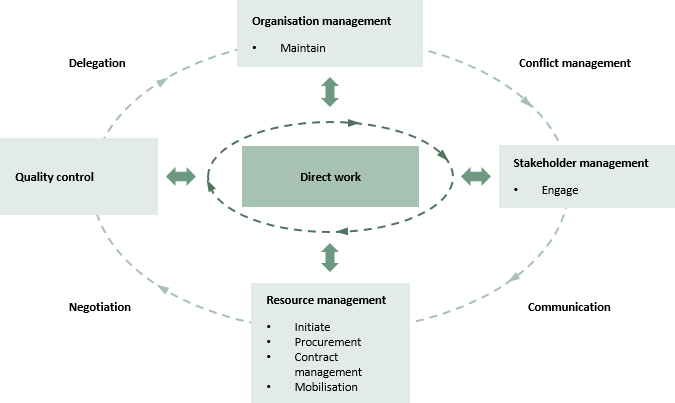General
The goals of this process are to:
- direct the performance of the work defined in the project delivery plans;
- delegate responsibility for producing deliverables to the appropriate people;
- manage the various technical, administrative and organisational interfaces.
Once the delivery of the work has been given full approval this process takes the latest plans and organises the creation of products that will be combined into deliverables. It represents the management interface between the sponsor, manager, project management team and delivery teams.
Click on the diagram below for explanations of inputs, the process and outputs.

Inputs
- Plans
-
The first time this process is invoked, the only input will be the project or programme plans. These will include scope documentation (specifications, WBS etc.), schedules and budgets.
-
Based on these plans, the manager will take packages of work and delegate them to the relevant individuals, teams and/or contractors.
- Approved changes
-
As the work progresses, changes will be approved and the baseline plans updated. Approved changes may affect current work or future work and the manager must accommodate them as necessary.
Back to direct work process diagram
Functions
Click here to see how the Praxis functions map to the detailed ISO21500 processes.
Using this process, the project manager will co-ordinate all the various resources used by the project or programme, including the management team, delivery team and stakeholders.
It also involves ensuring that the quality of the outputs meets stated acceptance criteria.
Click on the diagram below to see more information about each function

- Organisation management
-
Organisation management will have been initiated in the previous (definition) phase of the project or programme with the creation of the initial management team.
-
The wider organisation will now expand to include delivery teams and the management team may have to be augmented with specialists (planning, risk management, cost control etc.) to adequately manage the work.
- Stakeholder management
-
As work is commissioned, stakeholders need to be kept informed and some may need to be consulted about the way the work is to be performed.
- Resource management
-
If it hasn’t already been done, any infrastructure required to procure goods and services, and manage contracts, must be set up at the beginning of this process. Thereafter, there may be a continuous process of initiating, managing and closing external contracts as well as mobilising and demobilising internal resources.
- Quality control
-
While delegating work to individuals or teams, the manager must ensure they understand the level of quality required and the mechanisms that will be used to control quality. When deliverables are complete the manager will also ensure that appropriate acceptance procedures are implemented.
- Interpersonal skills
-
While all interpersonal skills are relevant in some degree to all processes, there are four that are particularly relevant to this process:
-
Directing work using individuals and teams requires careful delegation, ensuring that those who are performing the work are clear about what needs to be done and how success will be measured. They also need to understand escalation procedures and how they will gain support when they encounter issues.
-
Any allocation and performance of work by teams risks the creation of conflict. The delegating manager must be aware of this and seek to reduce conflict wherever possible, while acknowledging that some forms of conflict are necessary to build a team.
-
Stakeholders must be kept informed and consulted where necessary in accordance with the communications plan.
The mobilisation of internal resources and external contractors will require negotiation of service level agreements and formal contracts.
Outputs
- Deliverables
-
Although ISO21500 does not explicitly list deliverables as an output of this process, it is clearly implicit that these are the main output.
- Progress data
-
Progress must be monitored as work is performed. Time, cost and quality data will be gathered and sent as an input to the control work process which will make decisions about corrective action and change requests.
- Issues log
-
ISO21500 does not define the nature of an ‘issue’ and different approaches may be taken. A broad definition is anything that is in dispute or under discussion. This type of issue may be managed through conflict management or contract management.
-
A narrower definition considers an issue to be something that is forecast to take the work outside of agreed tolerances. This type of issue will be highlighted in the progress data and the control work process will decide whether a change request must be issued to consider changes to the baseline plans.
-
Regardless of how issues are defined, they should be recorded in an issue log. This will describe how the issues are addressed, plans for their resolution and the final outcome in each case.
- Lessons learned
-
Throughout the performance of work, lessons will be learned about what works, what doesn’t work and what could be improved. These lessons should be recorded in a lessons log.
Projects and programmes
The direct work process will need to decide how the work is decomposed into manageable pieces before delegating those pieces to others. This decomposition takes two main forms, horizontal and vertical.
What may be called ‘horizontal’ decomposition involves splitting the delivery phase of the life cycle into stages or tranches.
‘Vertical’ decomposition involves delegating packages of work. This can take the form of sub-projects or work packages within a project and tranches or projects within a programme.
The ISO21500 processes remain the broadly same in each level decomposition but it is up to the management team to decide exactly how they apply.
For example, while developing a ‘tranche charter’ in the decomposition of a programme may be appropriate, it would not be appropriate to develop a charter for a work package within a smaller project. In the latter case, it is still necessary to set objectives for the work package but this should be less formal than the full develop charter process.





